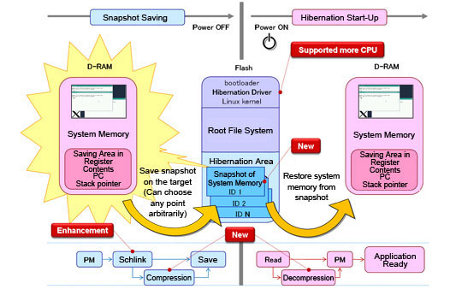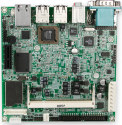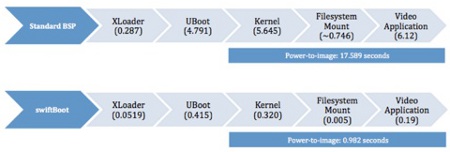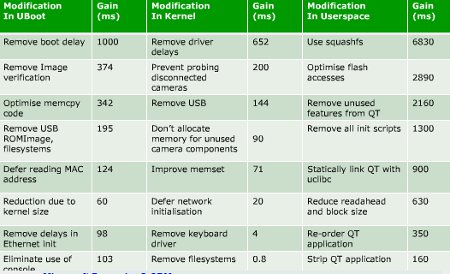Linux fast-boot technology touted for four-second Atom boot
Dec 1, 2010 — by Eric Brown — from the LinuxDevices Archive — 23 views[Updated: 2PM] — Lineo Solutions announced Warp for Atom, a new version of its Linux fast-boot technology claimed to boot in 4.06 seconds on an Intel Atom Z530-based single board computer (SBC). Meanwhile, MPC Data released a YouTube video of a Renesas SH7724-optimized version of its SwiftBoot Linux fast boot technology, claimed to boot up in just a second.
Lineo announced its Warp 2 fast-boot technology in 2008, touting it for booting Linux in 2.97 seconds on a low-powered ARM-based system. These claims have since moved to 1.8 seconds.
Booting up an Intel architecture processor such as the Intel Atom takes longer, so the company's new 4.06 second claim appears to be fairly significant. Lineo claims that normal boot-time on the test system is 54.72 seconds.

Warp 2 in action
(Click to enlarge)
 Warp for Atom can boot from various storage media, offers hibernation startup, and supports "multiple snapshots" handling, says Lineo. Customization to specific products can reduce the 4.06 second boot time even more, says the company.
Warp for Atom can boot from various storage media, offers hibernation startup, and supports "multiple snapshots" handling, says Lineo. Customization to specific products can reduce the 4.06 second boot time even more, says the company.
Warp 2 comprises a Linux kernel and bootloader, additionally offering a "hibernation driver," says the company. The driver takes a snapshot of RAM when hibernation is launched, saving the contents into flash memory, optionally compressing the data. On startup, the contents are quickly returned to RAM, so that the system resumes its previous running state. (For more on Warp 2, see our earlier coverage, here.)
Lineo Solutions was an early leader in commercial embedded Linux distributions, and offers a Lineo uLinux Elite cross development environment. Recent Linux-based products from Lineo Solutions include an LL-rescue failure analysis service for embedded Linux developers, released last year.
In May of this year, Lineo announced Linux-based server and client software enabling remote updates of embedded devices over the web. The SmartU2 for Linux System consists of core management server software called "SmartU2 Manager," as well as a 100KB "SmartU2 Agent" client that runs on embedded Linux devices.
MPC Data shows off one-second SwiftBoot demo
Japanese semiconductor firm Renesas Electronics has joined with embedded development firm MPC Data to demonstrate one-second Linux boot-up on a Renesas Super H SH7724 processor.
MPC Data's SwiftBoot technology is able to cold boot to a functional application in less than a second on a broad range of SoCs, development boards, and core architectures, claims the company. SwiftBoot supports Linux and uClinux on ARM, SuperH, MIPS, and Blackfin processor platforms, says MPC Data.

Comparison between typical Linux boot profile (top) and SwiftBoot profile (bottom)
(Click to enlarge)

SwiftBoot boot-time savings
(Click to enlarge)
MPC Data posted a YouTube video, below, purporting to show an SH7724-based device boot in one second.
Demo of "one second" boot of SH7724-based device on YouTube
Source: MPC Data; Renesas
(Click to play)
Like the SH7370, the SH7724 is based on the company's 500MHz SH-4A core, which is touted for enabling parallel processing of multiple applications. This would enable, for example, simultaneous dual-screen display of both an automotive navigation screen and a rear monitor display.
MPC Data has been a long-time partner with Renesas. For example, it collaborated on a Linux board support package for the Renesas RSK+7203 development board, based on its 200MHz SH7203 SoC.
Lineo, too, is familiar with Renesas SuperH chips, having teamed up with Timesys earlier this year to develop a LinuxLink subscription for the SH7724.
Stated Robert Kalman, marketing manager for Renesas Electronics Europe's SuperH team, "The combination of this software with our SuperH is an ideal and very complete solution that will leave end customers very impressed indeed."
Availability
Warp for Atom will be available Dec. 6, says Lineo Solutions. It will be demonstrated at at Embedded Technology 2010 (ET2010), which kicks off today at Pacifico Yokohama in Yokohama, Japan. More information on Warp 2 may be found here.
The version of SwiftBoot optimized for the Reneasas SH7724 appears to be available now from MPC Data's SwiftBoot site, here.
More information on the underlying technology behind SwiftBoot may be found at this ELCE conference presentation, here, and more may also be found in presentations posted at the Renesas Developers Conference, here.
This article was originally published on LinuxDevices.com and has been donated to the open source community by QuinStreet Inc. Please visit LinuxToday.com for up-to-date news and articles about Linux and open source.